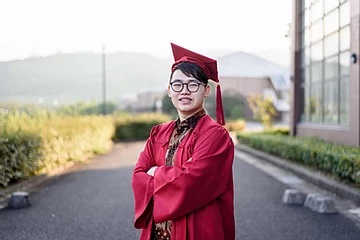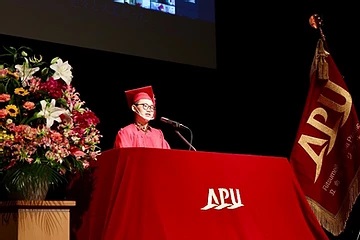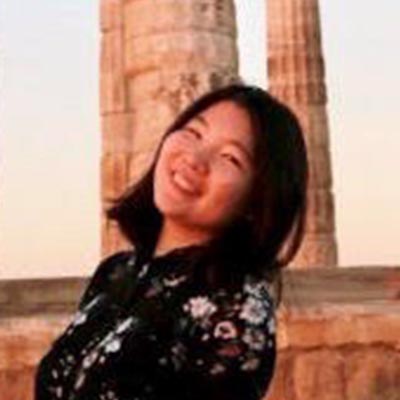A big congratulations to everyone in the Class of Fall 2020 on your graduation!
Hello everyone.
On Friday, September 18, APU held its fall graduation ceremony online, and the event was live streamed on the university’s official YouTube channel and Facebook page.
This year 437 undergraduate students and 77 graduate students graduated from APU.
Kelvin Tang, an Indonesian student who won the Ando Momofuku Honor Prize, gave the speech as the undergraduate student representative. After the graduation ceremony, a SPA interviewed Kelvin how it felt to graduate, what events from his time at APU left an impression on him, and what his future plans are.

Q: Now that the graduation ceremony is over, how do you feel?
To sum it up in one word: sad. I definitely feel more sad than happy. While I feel grateful to have spent the last four years here, I am sad to say goodbye to all the people I met. And because the ceremony was online, I had trouble timing the cap toss. (laughs)
The two things I will miss the most are the people and the place. I am going to miss all the people I met at APU, and I am going to miss Beppu, with its hot springs and ocean. I loved this city, so I’m going to miss everything about it.
Q: What led you to choose APU?
Prof. Dahlan visited my high school and provided an explanation about APU. This is what sparked my interest in APU. But actually, I have been a fan of Japan ever since I was five years old. I always wanted to live and study in Japan. I decided to come to APU because it has a good learning environment. Even if you can't speak Japanese, at APU, you can take major subjects in English.
Q: How did you overcome the linguistic and cultural barriers?
The hardest thing, in my opinion, was communication. Indonesians express themselves directly when they communicate, but in Japan, you usually have to communicate things indirectly. When I was an RA, I encountered language and culture barriers with others. I think I was able to overcome these barriers by trying to understand other people’s cultures and communicating with them.
Q: What was the biggest challenge you faced?
The biggest challenge was working as an RA for 2.5 years. It was my job to take care of students from many different countries, and I had to help them solve their problems. That was the hardest part of the job. I didn’t even have time to sleep. I typically slept about five hours a night. I was also an APU Student Ambassador and a member of ECOS*, a student group focused on environmental issues. It was hard to juggle all these responsibilities, but by keeping at it, I learned how to manage my schedule and I grew in the process.
*ECOS: Environmental Community of Sustainability.
A student organization that holds Earth Day events and conducts cleanup activities in Beppu.
Q: You said you wrote your undergraduate thesis based on your experience dealing with trash separation as an RA. What made you choose this topic?
RAs have to do kitchen duty and collect trash every day. I decided to write my thesis on trash separation because I noticed that some dorm residents could do it, but others could not.
I also launched the project to eliminate plastic bags from the CO-OP. It was really hard. We had meetings every day, took surveys, and had to negotiate with the Ritsumeikan CO-OP. It seems normal that there are no plastic bags in the CO-OP now, so I think we achieved a good outcome.
Q: What impact do you think this has had on the environment?
With this campaign, we were able to achieve a 95% decrease in plastic bag usage. The rest of Japan is now moving to eliminate plastic bags, so I think this was a good first step for APU.
Q: I hear you have a YouTube channel. Why did you start it?
During lockdown, I was at home all the time and had a lot of free time, so I decided to start a YouTube channel. I actually dreamed that I started making YouTube videos! (laughs) I thought this was a sign, so I started my channel straight away.
Q: Do you edit your own videos?
Yes, I film and edit them myself. In the beginning, it was pretty hard. It took me about one month to complete a video. I taught myself by using the Premiere Pro software. My videos focus on lifestyle. Most of my audience is Indonesian so I make videos about living in Japan.
Q: What kind of videos do you plan to upload in the future?
First, I plan to upload videos about the graduation ceremony and my last onsen in Beppu, and after that, moving out, my new dorm, and my new school. The reactions from my friends in Indonesia who watched my videos have been positive, and they’ve told me they want to come to Japan. Sometimes my videos are about the simple things in everyday life, so I am grateful when my friends send me messages like this after watching them.
A typical day consists of taking photographs, cooking, and planning my next YouTube video shoot.
Q: Looking back, how were your studies at APU?
I didn’t feel that my studies were too difficult, but group work was hard. When you do group work, you always have to deal with free riders. Once I enter the real world and start working, I will definitely run into problems when working with other people, so I think this experience helped me develop adaptability.
Q: Why did you decide to major in environmental studies?
I decided to learn about the environment when I was in the fifth grade in elementary school. There was a particular incident that led to this decision. I used to go to the park a lot back then, and I remember it suddenly became disrupted. I was angry that the park was left to deteriorate without any communication with the people living nearby. I felt there was a need for environmental communication, and because of that I knew I wanted to study environmental studies.
Q: Now that you’ve graduated, you are heading to graduate school. What kind of research do you plan to pursue?
At APU, I studied sustainability. I plan to focus on environmental education and want to create a new curriculum for that field. I think the reason environmental problems are so rampant is a lack of education and knowledge. First and foremost, I want to improve the way humans think about the environment.
Q: You have said that, in the future, you want to return to Indonesia and become the Minister of the Environment. Is this what you consider to be your ultimate goal?
Well, it is my intermediate goal. (laughs) I want to become a professor who helps develop leaders with an interest in the environment. As a professor, I would like to provide the younger generation with environmental education.
Q: What was your favorite class at APU?
It was Professor Yamashita’s “Environmental Communication” class that I took in the first semester of my third year. I would recommend this class to any student who wants to focus on environmental studies. Outside of my major subjects, my Japanese classes were excellent. I hope students will continue taking Advanced Japanese and Career Japanese even after they complete Japanese Intermediate Course. Some students stop taking Japanese after they complete Japanese Intermediate Course, but if you keep taking the classes up to Career Japanese, it will help you with your job search. I hope all international students will stick with their Japanese studies until the highest level.
Q: What should students do before they graduate APU?
One unique feature of APU is the sheer number of student organizations. Studying is definitely important, but there are many options at APU, so I would like to see students have experiences they can only have at APU (like working as a TA or RA or joining a student organization). It is a lot of work, but it pays off in the end.

We are grateful that you agreed to talk to us. From the interview, we were able to get a sense of how Kelvin pursues learning and other activities based on his own philosophy. We look forward to seeing his continued success.
You can check out Kelvin’s “Mr. Tang” YouTube channel here!
(Don’t forget to subscribe!)
Maasa Furumori
Hello, I’m Maasa from Japan. I was born and raised in Nara, and lived in the states for 2 and a half years during my highschool. I spend my weekend to watch movies, go to onsen, and do some outdoor activities. Climbing mt.Yufu in 2019 was one of my favorite outdoor activities I did in Oita.My next challenge is to make it to the top of mt. Kuju. As a member of SPA, we would like to spread more fun information from diversified standpoints so please check out SPA's Blog !












